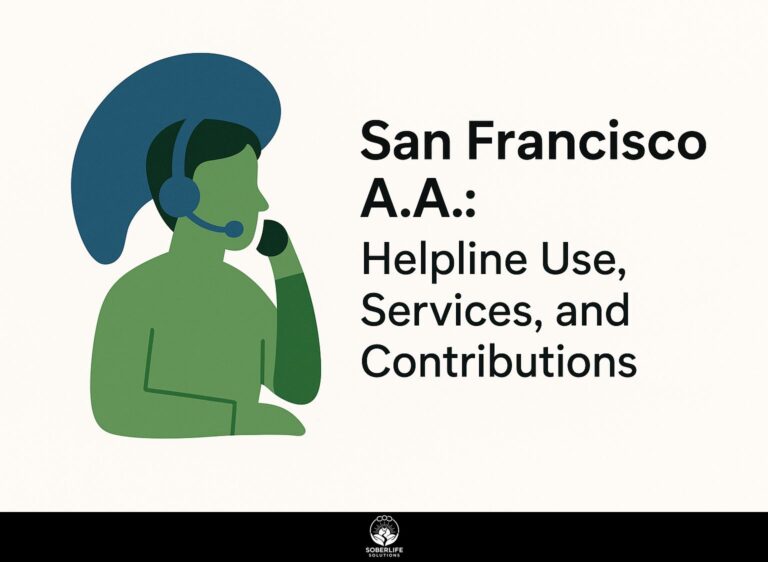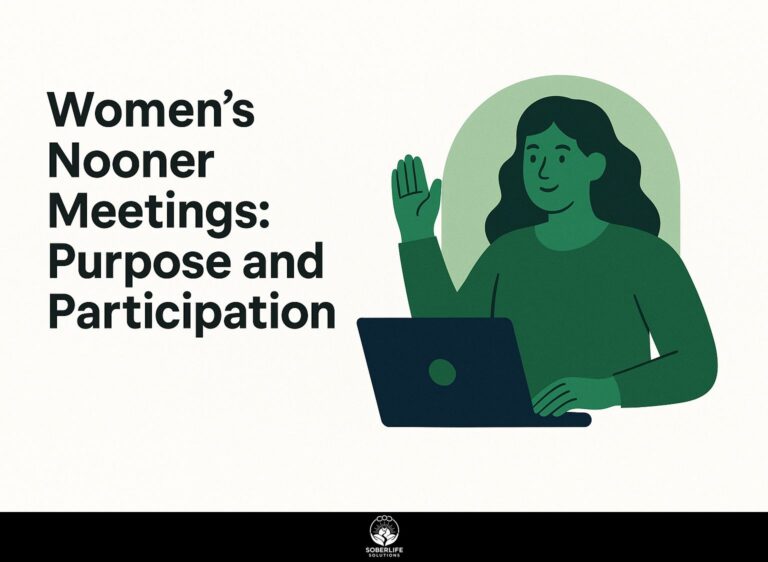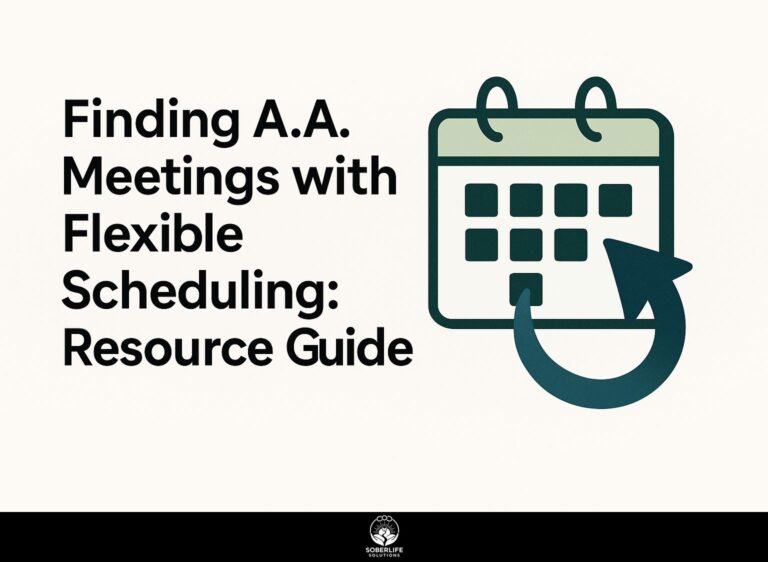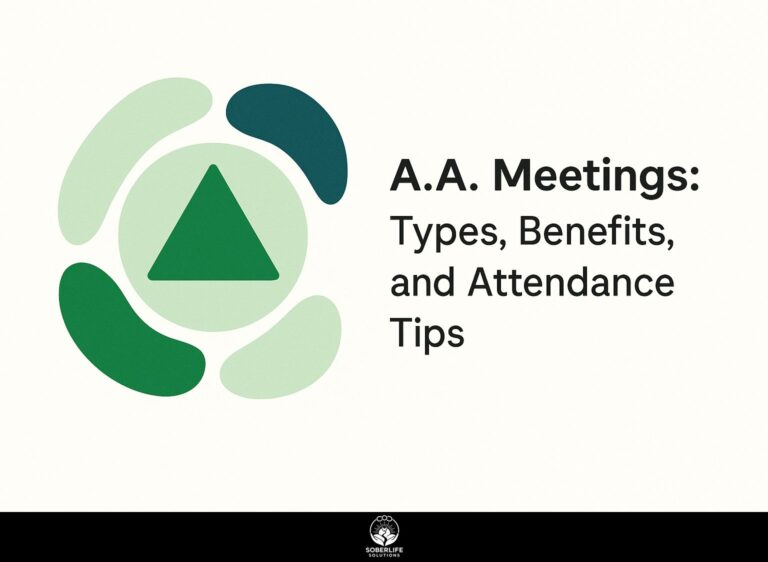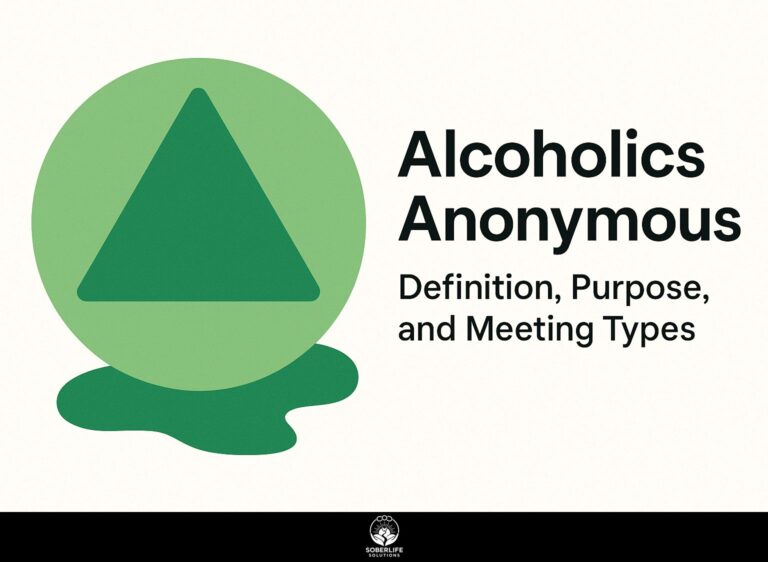How to Find and Access Online A.A. Meetings Globally
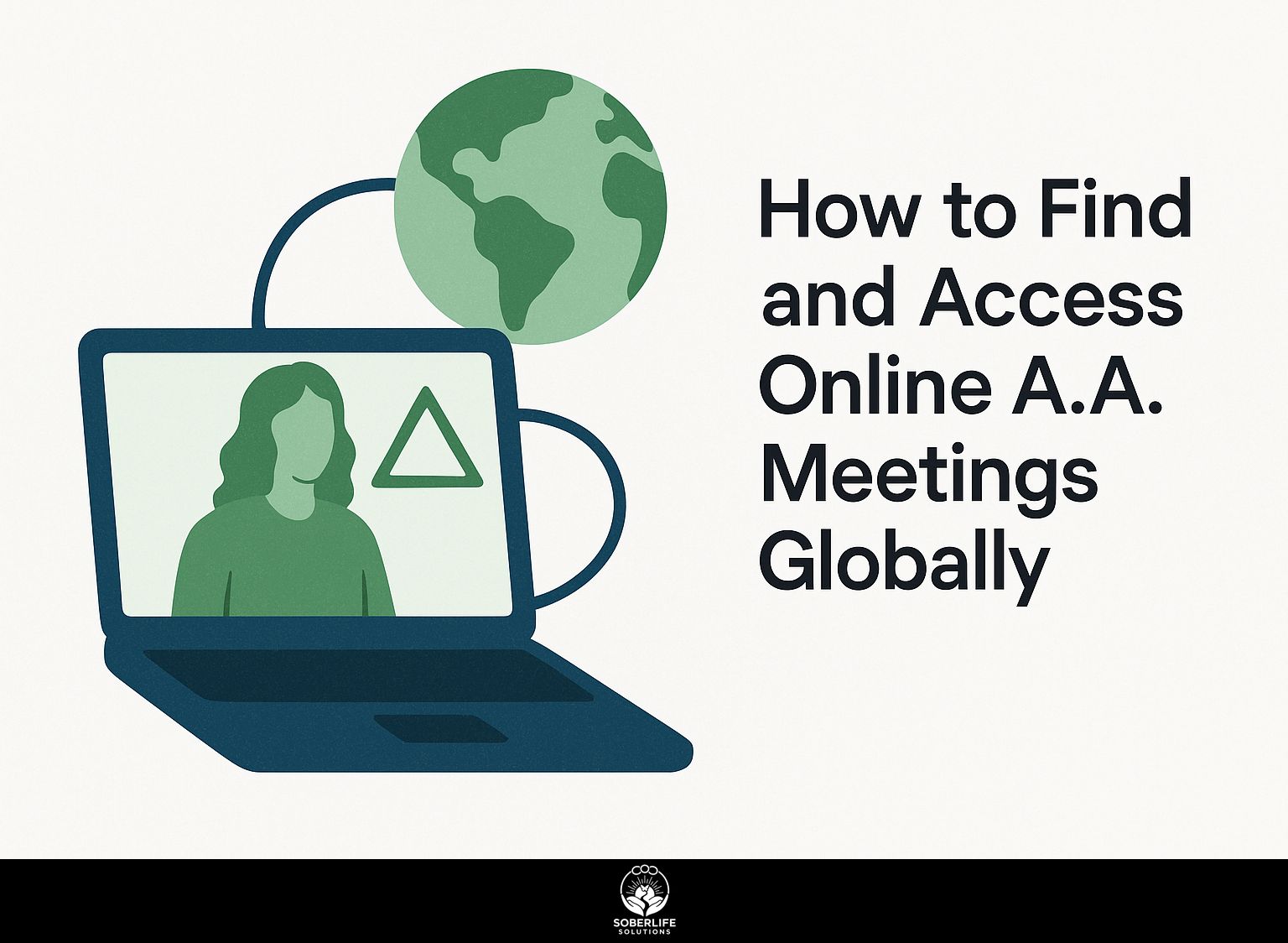
Looking to connect with the A.A. message globally? Learn how to locate and join A.A. meetings online, including details from the World Service Meeting in New York. These online meetings offer an important global space for people to share their experiences with recovering from alcoholism. Whether you need support or want to help others, this guide will show you how to connect with the global A.A. community from your home.
Key Takeaways:
Overview of Alcoholics Anonymous
Alcoholics Anonymous (A.A.) is a fellowship of individuals who share their experiences to help each other recover from alcoholism, with over 2 million members globally.
Founded in 1935, A.A. employs a 12-step program that guides members through recovery, emphasizing personal accountability and growth. For context, an in-depth analysis by Wikipedia explores the historical factors that shaped Alcoholics Anonymous.
Each participant anonymously shares their story, promoting a safe space where honesty flourishes. For newcomers, attending local meetings helps build a sense of community; resources like the A.A. website and literature are very helpful for learning the principles of sobriety. If you’re interested in understanding more about the process, our overview of Alcoholics Anonymous meetings and joining procedures offers valuable insights.
The shared experiences turn loneliness into support, showing that no one has to face addiction alone. Maintaining anonymity is important for honest conversations, allowing trust and openness in sharing stories.
Benefits of Online Meetings
Online meetings remove distance limitations, enabling people from different places, such as New York and South Africa, to join and discuss their recovery experiences.
These platforms make it easier for people to use them and provide outstanding flexibility. For instance, meetings can be scheduled at various times throughout the day, catering to different time zones and personal commitments.
In addition, many participants report feeling more comfortable engaging in discussions from their homes, which can ease anxiety associated with in-person gatherings.
According to recent statistics, attendance for online meetings has surged by over 50% in the past year, highlighting their growing importance in the recovery community. For a deeper understanding of this trend, see also: Virtual recovery groups trending – Sober Life Solutions. For those interested in a comprehensive overview, this analysis by Cvent covers various event statistics shaping the industry.
Finding Online A.A. Meetings
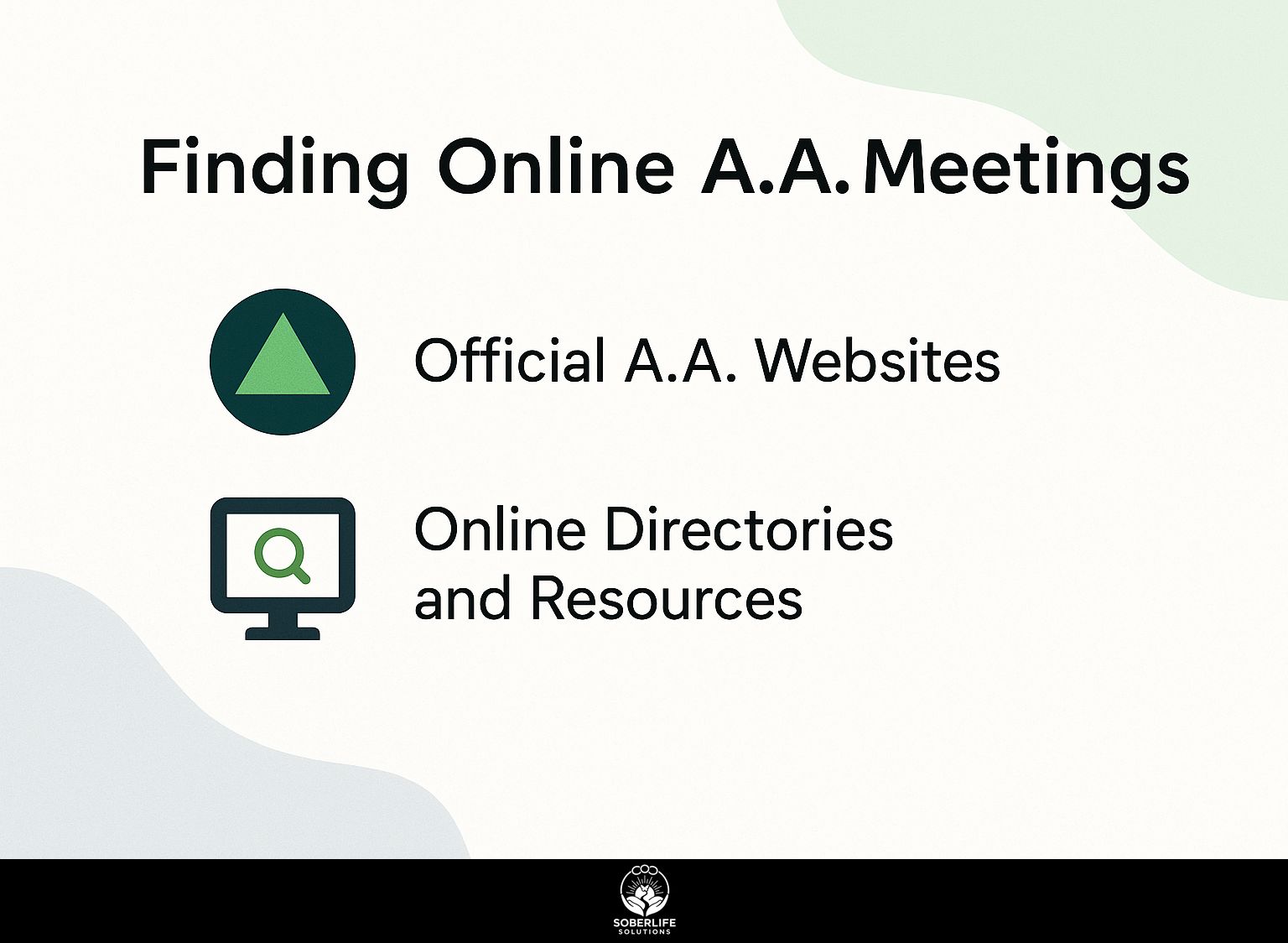
Finding online A.A. meetings involves using official websites and community directories, making it easy for members to find sessions that fit their schedule. For those new to the process, learn more about joining online AA meetings in our step-by-step guide designed specifically for newcomers.
Official A.A. Websites
The official Alcoholics Anonymous website offers a complete list of online meetings worldwide, organized by time zones and meeting formats.
To locate online meeting schedules, go to aa.org and look for the ‘Find a Meeting’ section. You can sort results by location, like your city or zip code, to find local help.
Specify the type of meeting, whether you prefer open, closed, or specialized formats like women’s or LGBTQ+ meetings.
Use the search tool to find days and times that fit your schedule, so you can join a supportive community whenever you want.
Online Directories and Resources
Various online directories, like the Online Intergroup of Alcoholics Anonymous, gather long lists of virtual meetings to help members globally.
For instance, you can use the Meeting Guide app to locate meetings by selecting filters such as country and language, helping you find the support that fits your needs.
In the Rooms is another key directory that provides a wide range of events in different formats. Make sure to routinely check these directories for updates, as meeting times and formats can change frequently.
Staying informed helps maintain consistency in support, particularly in a virtual environment where flexibility is key.
Accessing Meetings
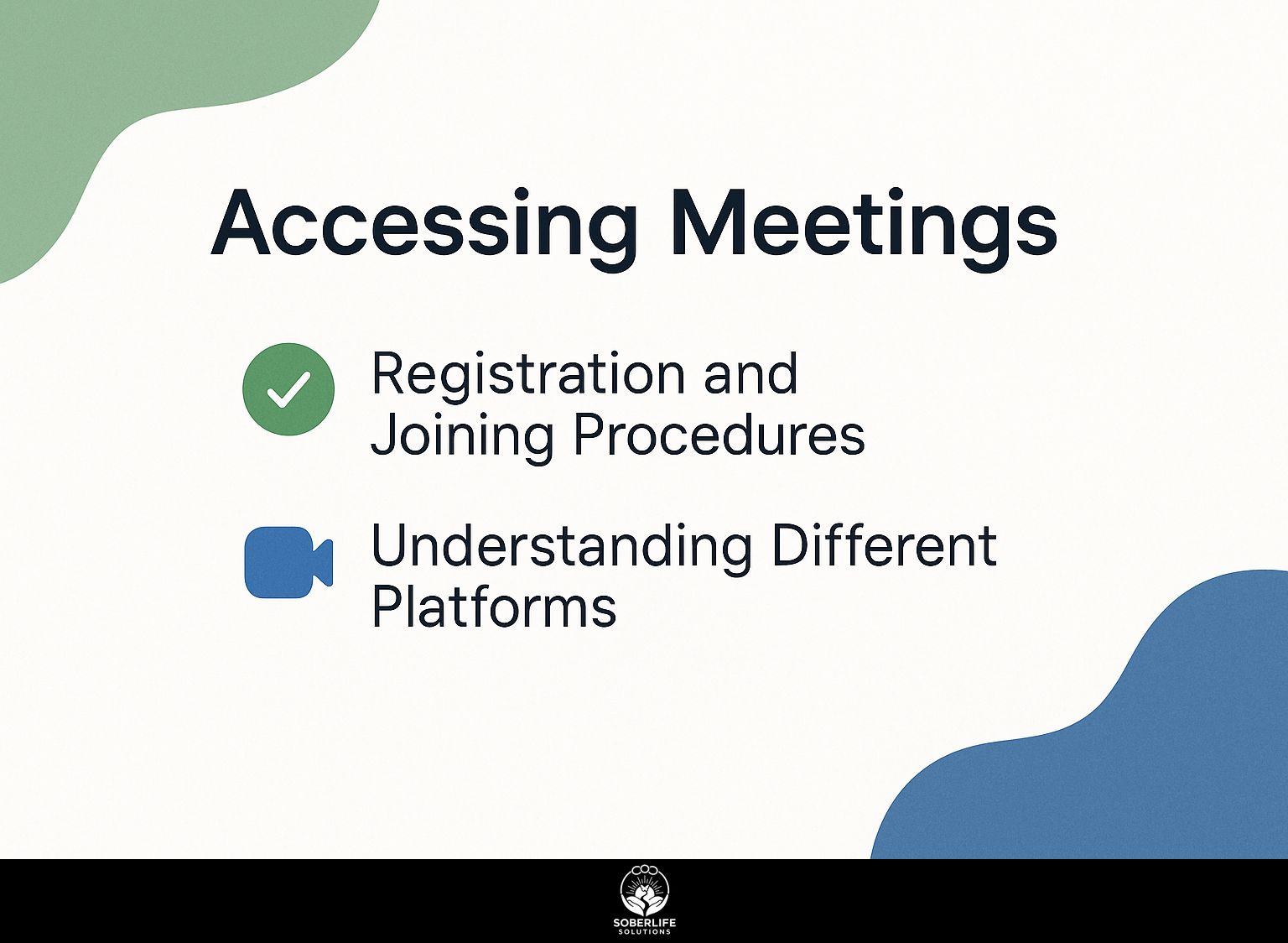
Joining online A.A. meetings requires learning how to sign up and use the necessary software or websites for participation.
Registration and Joining Procedures
Most online A.A. meetings use platforms like Zoom, requiring participants to create a free account and occasionally register in advance.
To join a Zoom meeting, visit zoom.us and click ‘Sign Up Free’ to create an account. After registration, you’ll often find specific links to A.A. meetings on local group websites or A.A. directories, which may require advance registration.
To use Google Meet, go to meet.google.com and sign in with your Google account. You can make a meeting link to share or join one that your group has given you.
Check your microphone and camera before the meeting to prevent any hold-ups.
Understanding Different Platforms
Learning how to use online meeting platforms like Zoom and Google Meet makes it easier to join online A.A. sessions.
Zoom has a simple interface, allowing new users to join meetings without any technical problems. Security features like password protection and waiting rooms help create a safe environment.
In comparison, Google Meet integrates seamlessly with Google Workspace, allowing users to schedule meetings via Calendar. Both platforms allow up to 100 participants for free, but Zoom’s breakout rooms are especially useful for smaller group talks, creating a closer environment for exchanging experiences. According to a recent publication by TechRadar, these features are among the reasons Zoom stands out as one of the best free video conferencing services available.
Time Zones and Scheduling
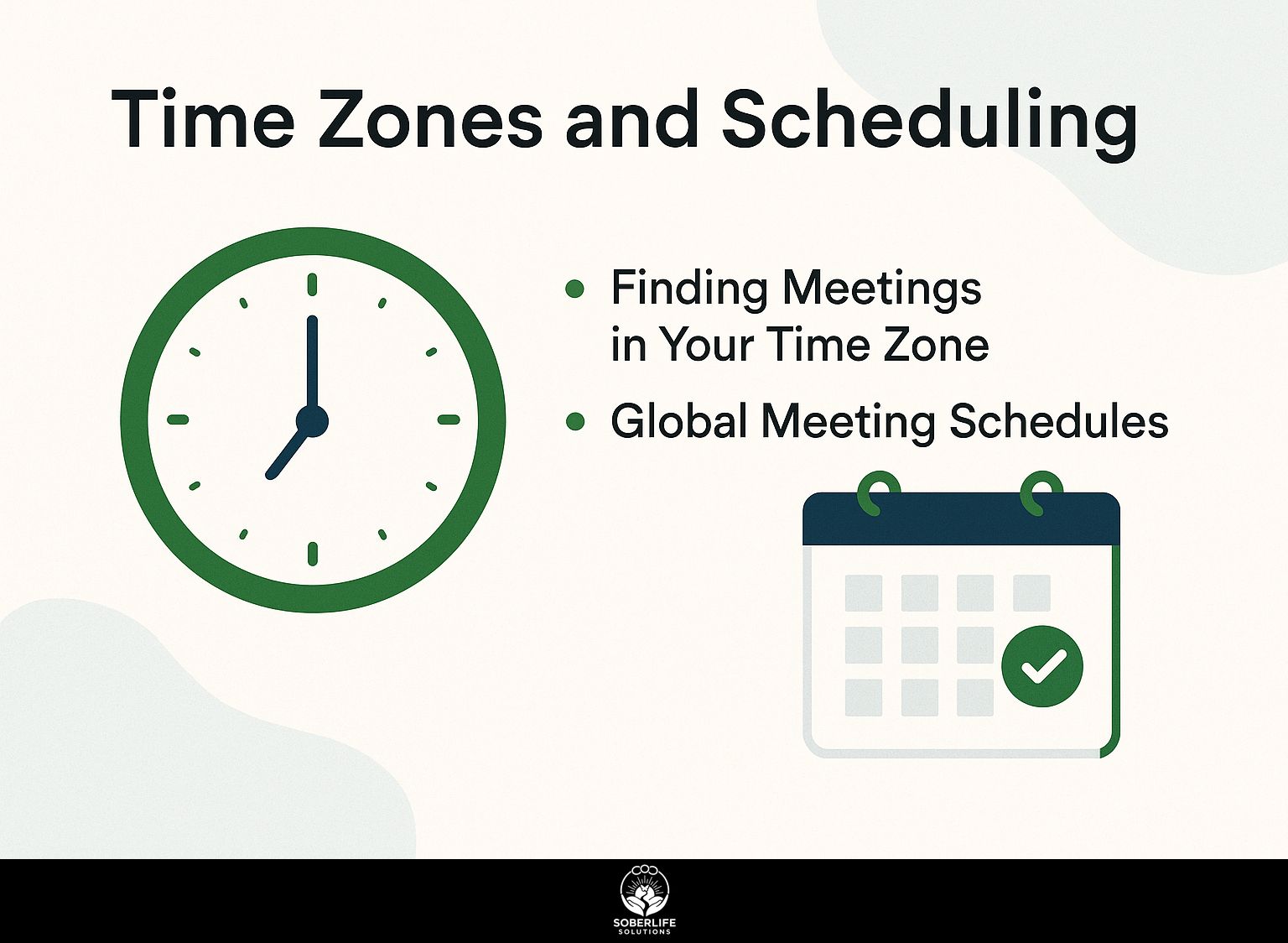
Knowing time zones is important for joining online A.A. meetings, especially when participants are in different countries.
Finding Meetings in Your Time Zone
Using tools like Time Zone Converter and World Time Buddy helps A.A. members identify meeting times across different time zones effectively.
To convert meeting times effortlessly, start by entering the meeting’s timezone in the tool. For instance, if a meeting is scheduled for 6 PM EST, using Time Zone Converter, select EST and input this time.
The tool will then provide you the equivalent times for various zones like PST (3 PM) or GMT (11 PM). World Time Buddy shows time zones in a way that’s easy to understand, allowing you to compare different places all at once.
This is particularly helpful for people planning participation from countries like Canada, the UK, and Australia, ensuring everyone joins at the right time.
Global Meeting Schedules
Global meeting schedules are often published on official A.A. websites, allowing members to plan their participation in advance.
To access these schedules, visit the general A.A. website or local intergroup pages. Resources like the A.A. mobile app and various online directories can provide updated meeting times.
It’s advisable to check these listings regularly, as meetings can change or increase in frequency. Using social media to connect with local A.A. groups can help you stay updated on any last-minute updates or changes, so you can get the support you need.
Remember to take note of the time zones if attending virtual meetings!
Types of Online A.A. Meetings
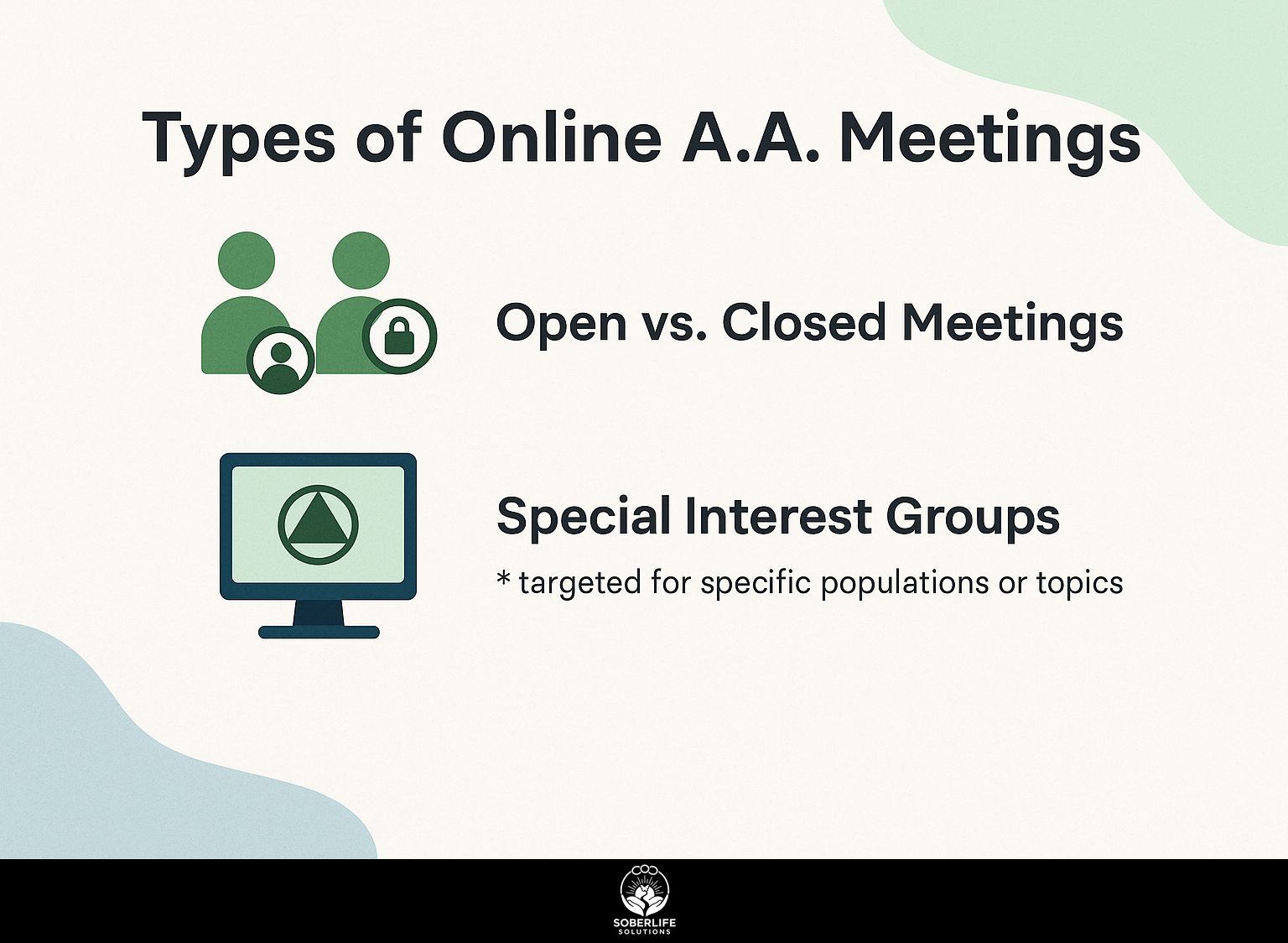
Online A.A. meetings are available in different setups, meeting the needs and preferences of members looking for recovery support.
Open vs. Closed Meetings
Open meetings welcome anyone interested in A.A.’s message, while closed meetings are strictly for individuals struggling with alcoholism.
In open meetings, participants can talk about their thoughts and experiences with alcohol use, encouraging a supportive group. For example, anyone can attend a weekly open meeting at a local community center to listen and learn.
Conversely, closed meetings, such as those held in private homes, focus exclusively on members, facilitating deeper discussions and confidentiality. To choose a format that works for you, think about how comfortable you are with discussing personal experiences and whether you want general knowledge or closer support.
Going to both types might give you a balanced view.
Special Interest Groups
Special interest groups within A.A. cater to specific demographics, such as women, LGBTQ+, or young adults, enhancing community engagement and support.
These groups offer a setting where people can talk about their own experiences and difficulties.
The Women’s Group meets every Thursday at 7 PM to talk about subjects such as motherhood and relationships.
The LGBTQ+ group gathers every second Saturday at 3 PM to offer a friendly space for discussing identity.
Young Adults in Recovery (YAR) meets on Wednesdays at 6 PM, addressing challenges like peer pressure and education. If you’re looking to learn more about how to participate, understanding the joining process of Alcoholics Anonymous can be beneficial.
By joining, people find relatable help, encouraging a better recovery process.
Tips for Participating in Online Meetings
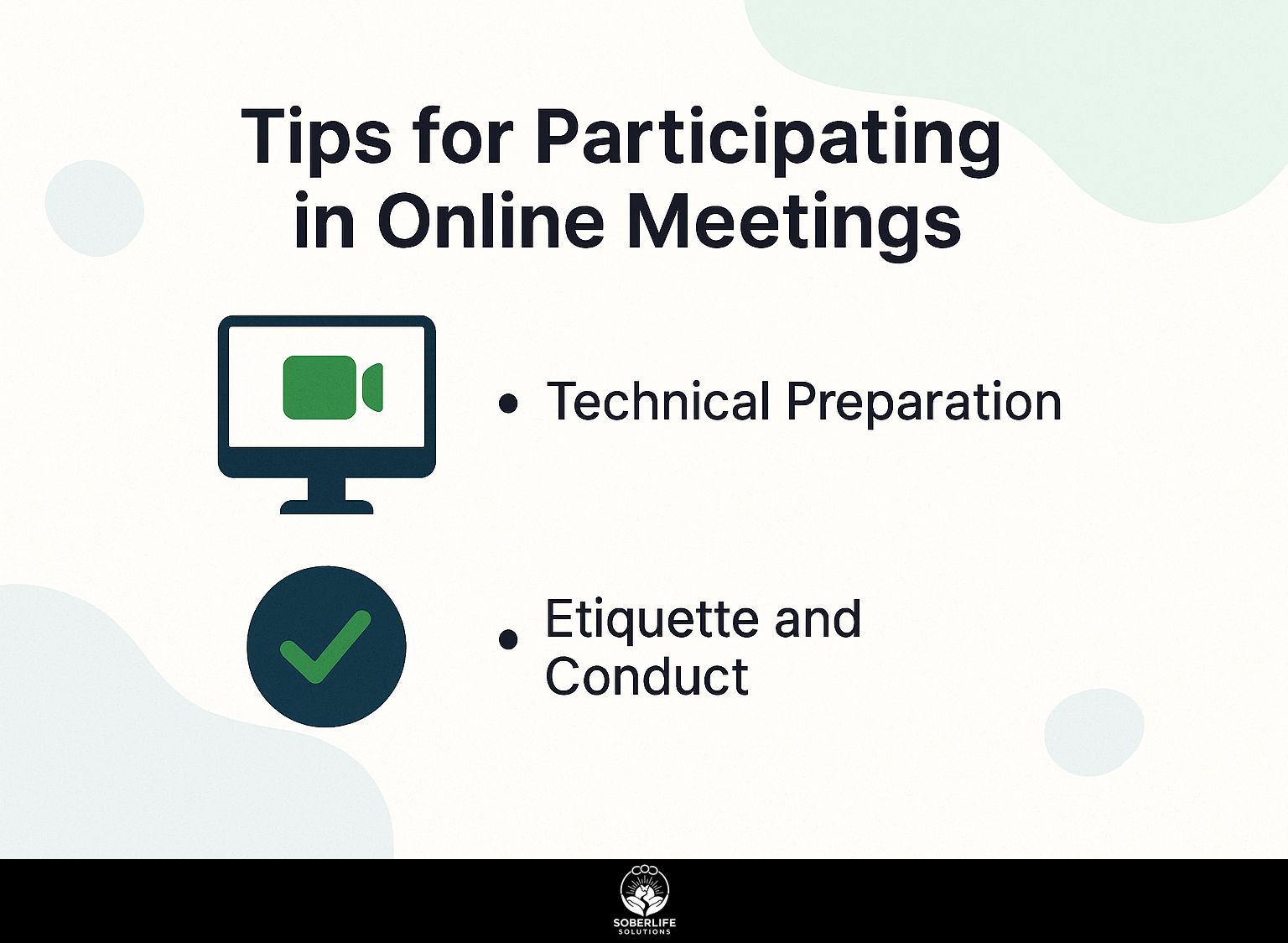
To join online A.A. meetings successfully, prepare your technology and follow the guidelines to create a supportive environment.
Technical Preparation
Having a stable internet connection and getting to know the meeting platform, such as Zoom, can greatly improve how online meetings go.
Before attending an online A.A. meeting, participants should complete a few preparatory tasks.
- Test your audio and video settings to confirm that your microphone and camera work properly.
- It’s also advisable to join the meeting a few minutes early to address any technical issues that may arise.
- Create a distraction-free environment by finding a quiet space, ideally with a closed door.
This will help you engage more fully and contribute to a respectful atmosphere for all attendees.
Etiquette and Conduct
Following meeting rules, like turning off your microphone when you’re not talking and allowing others to speak without interruption, creates a polite online setting.
Participants should avoid distractions by turning off notifications and using a dedicated workspace.
Using features like the ‘raise hand’ button in Zoom helps keep discussions orderly, allowing everyone to share their thoughts without interrupting others.
For instance, during a recent team meeting, the effective use of the raise hand feature led to a smooth exchange of ideas, preventing people from talking over one another.
By following these practices, teams can create a positive environment and increase productivity.
Support Resources
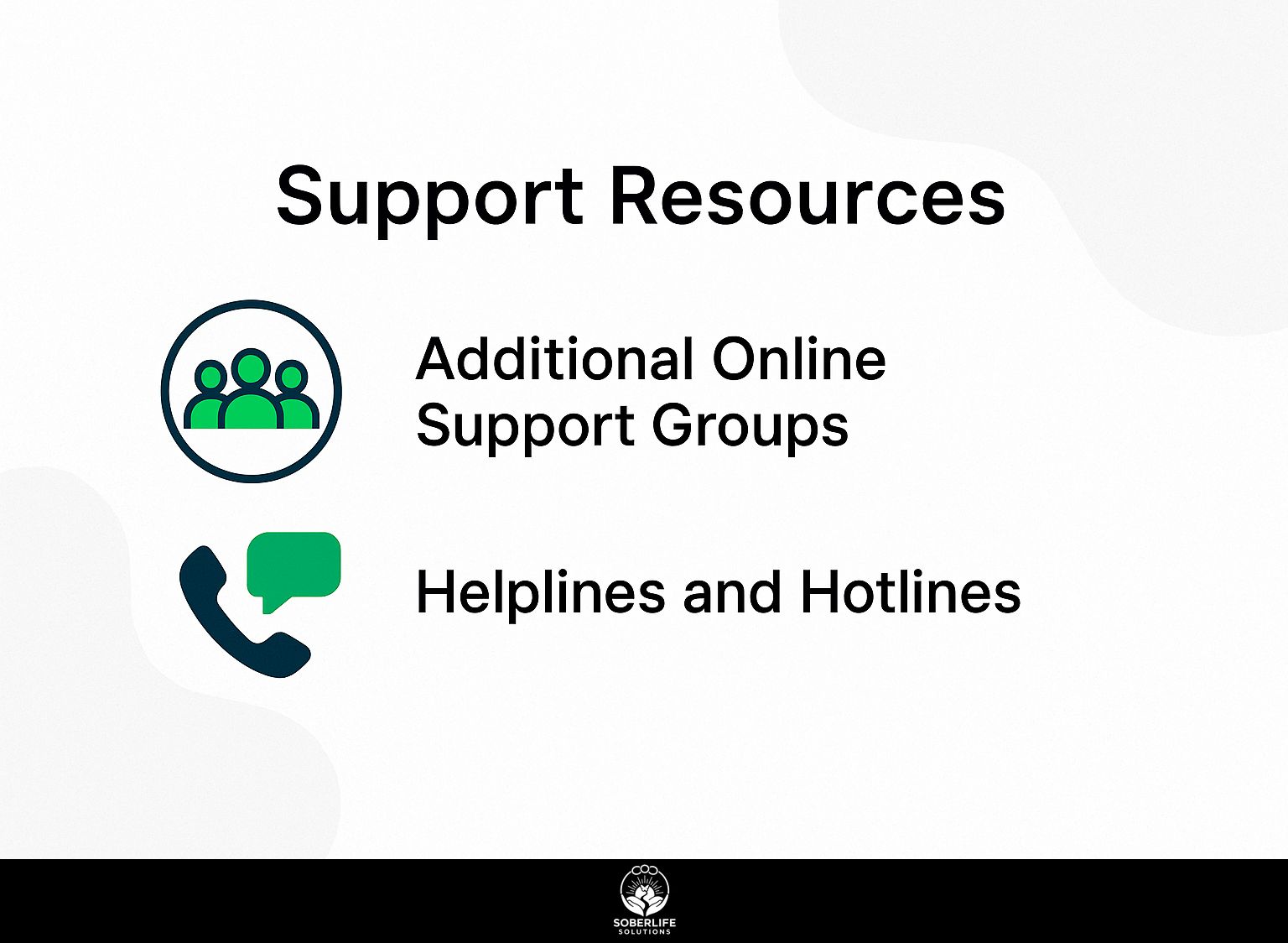
Various support resources are available alongside online A.A. meetings, offering people more ways to get help during their recovery.
Additional Online Support Groups
Different online support groups, like SMART Recovery and Refuge Recovery, offer alternative choices to traditional A.A. meetings for handling addiction recovery.
SMART Recovery supports individuals in managing their lives by teaching cognitive-behavioral methods that boost personal motivation and manage impulsive behavior. It offers tools such as the SMART Recovery Toolbox, which includes worksheets and online meetings for support. For a deeper understanding of how these principles and benefits can aid in recovery, consider exploring our detailed guide on SMART Recovery: Principles and Benefits.
In contrast, Refuge Recovery centers on mindfulness and meditation as a path to recovery, with an emphasis on compassion and community support. Its meetings encourage personal sharing and healing through mindful practices.
Both groups maintain supportive online forums, expanding access to recovery resources, and complement A.A. with strategies catering to diverse personal philosophies.
Helplines and Hotlines
Helplines and hotlines provide immediate support for people needing help with alcoholism and addiction problems.
Many reliable helplines are ready to help 24/7.
The National Helpline, 1-800-662-HELP, offers free, confidential advice and referrals 24/7.
Local Alcoholics Anonymous (A.A.) chapters can be found through their website or by calling 212-870-3400, enabling you to connect with peers in your area.
The Substance Abuse and Mental Health Services Administration (SAMHSA) provides resources and support for individuals in crisis.
Using these services is necessary for receiving the support needed to heal.
Frequently Asked Questions
What are online A.A. meetings and why should I consider attending them?
Online A.A. meetings are support groups that use internet tools to connect people dealing with alcohol addiction. They provide a secure and easy option instead of face-to-face meetings, helping people with busy lives or those far from meeting locations to get support and remain sober.
How do I find online A.A. meetings globally?
You can find online A.A. meetings worldwide in different ways. You can search for virtual meetings on the official A.A. website, use virtual meeting directories, reach out to local A.A. groups for information, or join online A.A. communities on social media platforms.
Do I need any special equipment or software to attend online A.A. meetings?
No, you do not need any special equipment or software to attend online A.A. meetings. You only need a reliable internet connection and a device (like a computer, tablet, or smartphone) that can connect to the internet.
Can I remain anonymous in online A.A. meetings?
Yes, you can choose to remain anonymous in online A.A. meetings. Just like in traditional meetings, anonymity is highly valued in A.A. and it is up to each individual to share as much or as little personal information as they feel comfortable with.
Are online A.A. meetings as effective as in-person meetings?
Many people have found online A.A. meetings to be just as effective as in-person meetings. While there may be some differences in the experience, the core principles and support from fellow members remain the same. It mainly relies on the person and what suits them the most.
Are there any language barriers for attending online A.A. meetings globally?
No, most online A.A. meetings provide translation services or are held in different languages to help people from various countries and cultures. You can also specify your preferred language when searching for virtual meetings.

